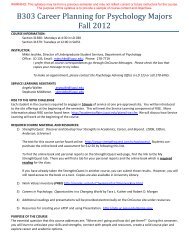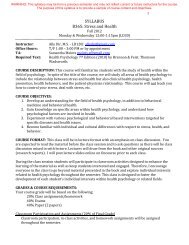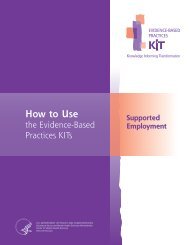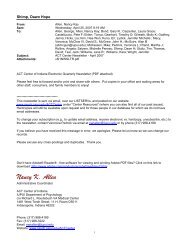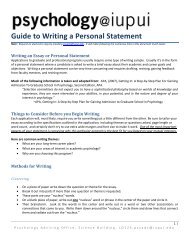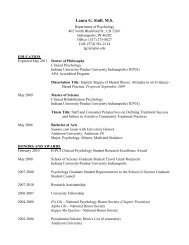Supported Employment: Training Frontline Staff - SAMHSA Store ...
Supported Employment: Training Frontline Staff - SAMHSA Store ...
Supported Employment: Training Frontline Staff - SAMHSA Store ...
Create successful ePaper yourself
Turn your PDF publications into a flip-book with our unique Google optimized e-Paper software.
In summary, SE services can play an important role<br />
in facilitating the recovery of consumers. Use the<br />
interpersonal skills described above to promote<br />
hope, support consumers in their effort to take<br />
personal responsibility for their health and life, and<br />
help consumers to get on with life beyond illness.<br />
Harnessing the help of other<br />
critical stakeholders<br />
<strong>Employment</strong> specialists need to involve as many<br />
stakeholders as possible in the process of exploring<br />
job possibilities, searching for work, and providing<br />
support after consumers find work. Stakeholders<br />
may include anyone with an important role in<br />
consumers’ lives or anyone who is interested in<br />
playing a bigger role.<br />
Potential allies in supporting<br />
consumers’ work life<br />
• Treatment team members<br />
• Family<br />
• Friends<br />
• Community members such as clergy,<br />
teachers, or parole officiers<br />
• Community business leaders<br />
• Employers (for working consumers)<br />
• Vocational Rehabilitation staff<br />
Maintaining good communication among all<br />
stakeholders and getting everyone’s input ensures<br />
that all involved work together toward the same<br />
goal. Keeping everyone involved also increases<br />
the chances of identifying creative solutions to<br />
problems that interfere with achieving goals. A<br />
larger support network means more people and<br />
resources available to participate with problemsolving.<br />
Finally, teamwork minimizes the possibility<br />
that some excluded stakeholders will undermine<br />
consumers’ work goals because they are perceived<br />
to be inconsistent with their own goals.<br />
Specific strategies for talking with employers<br />
Consumers who do not disclose their<br />
illness to employers<br />
The strategies for communicating with employers<br />
depend largely on whether consumers want<br />
to disclose their mental illness to prospective<br />
employers. If consumers have chosen not to reveal<br />
their disabilities, your contacts with employers are<br />
naturally quite limited, and often you will have no<br />
contact with them at all.<br />
For consumers who choose not to disclose their<br />
illness, you may have contact with prospective<br />
employers in the process of conducting generic<br />
job development. The focus of these contacts is<br />
on exploring with employers the nature of their<br />
expectations for different jobs, characteristics of<br />
ideal employees, and other information that may<br />
help a job applicant.<br />
You can then pass job leads based on generic job<br />
development on to consumers who wish to not<br />
disclose their disability, who can pursue these jobs<br />
with the extra help of the information that you<br />
have gathered. Thus, in the case of consumers who<br />
choose not to disclose their illness, your contacts<br />
with employers are usually limited to the job<br />
development phase.<br />
Of course, such consumers may choose to disclose<br />
their mental illness at some point after they have<br />
gotten the job. In this case, other opportunities<br />
may exist for you to have contact with employers to<br />
facilitate job support.<br />
Consumers who disclose their illness<br />
to employers<br />
For consumers who choose to disclose their illness<br />
to employers, your contacts with employers may<br />
greatly increase the success of helping consumers<br />
find and keep a job.<br />
Module 34 14 Job Assessment Supports and and Collaborations<br />
Job Finding



